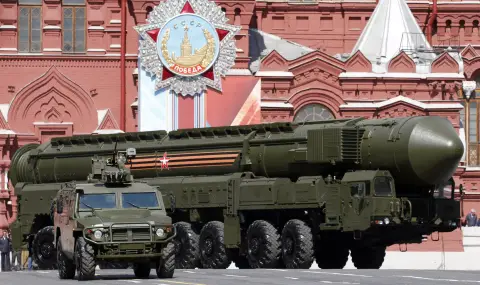There is a terrible danger that the war in Ukraine will turn into nuclear, writes Foreign Affairs. And completely by accident.
The greatest responsibility of a nuclear power like Russia is to safeguard its warheads. But the more Ukraine strikes targets in Russia, the clearer it becomes that Russia's reluctance to adequately protect its nuclear arsenals it stores in the west — which are now within striking distance of Ukrainian missiles and drones and even Ukrainian troops — represents terrible danger.
At the beginning of the war, concerns that the invasion had increased the danger of a nuclear detonation or accidental explosion focused on the risk to Ukraine's four nuclear power plants and threats by Russia to deliberately escalate the conflict with nuclear.
Every week, Russia launches up to 800 guided aerial bombs and over 500 attack drones against Ukrainian cities and energy plants. In response, Ukraine began launching its own drones at carefully selected Russian targets. Ukraine has every right to defend itself. Drones have even reached the capital Moscow. Currently, 14 Russian nuclear storage facilities are within range of Ukrainian drones.
The responsibility for moving the nuclear warheads out of harm's way rests with the Russian government. Russia knows that its warheads should not be deployed near conventional military operations. But why doesn't Russia move its nuclear bombs further away, especially after the Ukrainian army's invasion of Kursk?
Two of the possible reasons are as follows: Russian President Vladimir Putin may feel that moving Russian nuclear warheads would be a sign of weakness; or the Russian military may fear that the West will misinterpret the warhead move as preparation for a nuclear attack, prompting a pre-emptive strike by NATO.
The country that probably has the most influence over Russia's handling of its nuclear arsenal is China. If Beijing does not press ahead, the risk of Russian nuclear facilities becoming involved in the war against Ukraine will continue to grow, with potentially catastrophic consequences for both Russia and the rest of the world. One missile attack or drone strike could turn the war into a nuclear war.
Immediately after the end of the Cold War, most experts believed that the main threat to Russia's nuclear stockpile was a potential terrorist attack, which could even be carried out by a dozen attackers, rather than an armed conflict with another well-armed state. Russia has taken measures and strengthened security and defense facilities around its nuclear arsenal. But these improvements are not designed to protect warheads from attacks by a well-armed military force — and cannot do so. Warheads can be accidentally hit by drones or missiles - or deliberately attacked or stolen.
Russia has also violated a sacred principle of nuclear security by launching attacks against Ukraine from military bases that store nuclear warheads, thus making those bases a legitimate target for a counteroffensive.
A strike on a storage site alone would not detonate warheads with a nuclear explosion. But if a warhead is not in its bunker because it is being moved for maintenance within a storage facility or at a rail transfer point and is hit by an armed drone or missile, it can cause a large explosion. International observers may not even be able to assess how catastrophic such a strike would have been because Russian reports of nuclear incidents have historically been unreliable.
Nuclear warheads are particularly dangerous when located at Russian rail transfer points. While it is unclear whether Russia is currently moving warheads through any of these locations, if it does, then a Ukrainian drone or bomber debris, a Russian air defense system, or a missile attack could easily hit them. Given that Russia has thousands of warheads, there are almost always a handful being moved for maintenance. Imagine if the United States or Ukraine detected covert movement of a warhead and interpreted it as part of a deliberate operation against Ukraine or a NATO country: they would have to consider a pre-emptive strike.
Besides the immediate risks, keeping nuclear warheads in a war zone increases the likelihood of escalation by the Kremlin. Russia's nuclear doctrine asserts that an attack on any element of its deterrent justifies a nuclear response. It is unclear whether an accidental strike on a nuclear warhead storage site would cross Russia's nuclear red line.
The fact that its nuclear warheads are so close to Ukraine may actually tempt Russia to conduct a false flag operation on its own storage sites to justify a nuclear attack.
But perhaps the greatest danger that Russia's nuclear storage sites now pose is one that was originally envisioned after the end of the Cold War: that is, the danger that the warheads could be captured by a small group of fighters. Russia still faces internal threats, including terrorists, separatists and the thousands of former Wagner PMC fighters now scattered across Russia and Belarus.
To avoid a nuclear catastrophe, in the near future Russian nuclear warheads must be removed from any base that is close to wartime operations and bases from which Russia conducts conventional attacks. Nuclear deterrence does not depend on warheads being deployed on a country's front lines. In fact, a country best maintains its deterrence if it stores its nuclear weapons well, out of harm's way.
After all, even China cannot view Russia as a reliable nuclear power or partner if Russia cannot shield its nuclear warheads away from military operations. The world needs to convince Russia that it is fundamentally jeopardizing its reputation as a responsible nuclear power: its management of its nuclear arsenal over the past two and a half years clearly violates the basic responsibilities expected of nuclear states.
